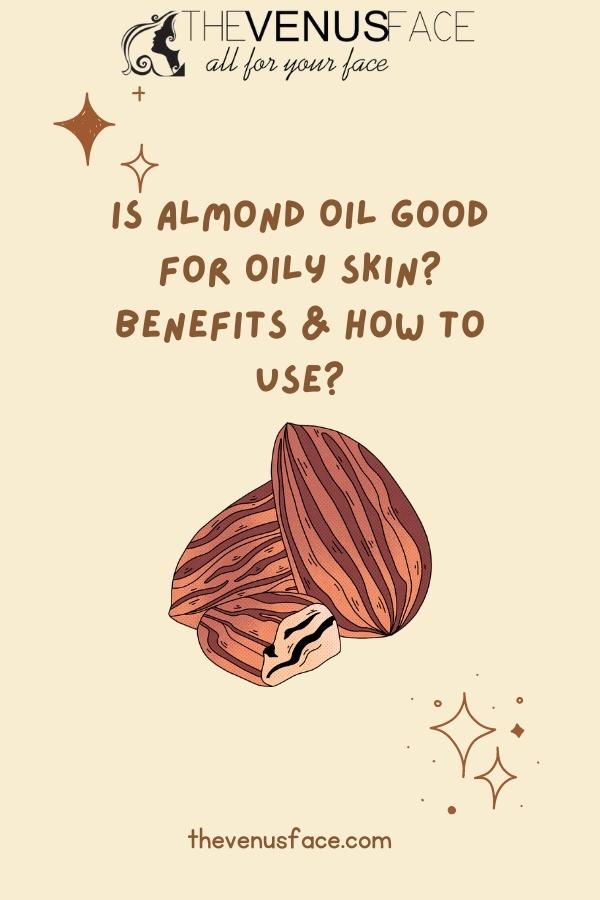Is almond oil good for oily skin? Learn more in this post.
Oily skin is caused by an overproduction of sebum, which is the oil that lubricates your skin. Sebum is produced by sebaceous glands, which are tiny glands that are located all over your body. Sebum production is usually regulated by hormones, but in people with oily skin, the sebaceous glands produce too much sebum. This can be due to a variety of factors, including genetics, hormones, diet… and even anesthesia or wearing glasses.
Oily skin is a condition that affects many people. Despite being a common problem, there is still much confusion about what causes oily skin and how to best treat it. Some people use medicines, others use skincare products, and some people use natural remedies to solve their oily skin, including applying oils to the skin.
Some natural oils, such as coconut oil and jojoba oil, are known to help treat oily skin, then what about almond oil? Is almond oil good for oily skin?

Is sweet almond oil good for oily skin?
Yes, it is. This oil is non-comedogenic, which means it won’t clog your pores. In fact, almond oil is suitable for every skin type since it is mild and hypoallergenic. Besides that, it has many benefits to your skin.
Best pure almond oil for the skin
Almond oil benefits for oily skin
This oil contains vitamin E, which is a rich antioxidant. It protects the skin from harmful UV sun rays. Furthermore, it contains vitamin A, which is a form of retinol that may promote the formation of new skin cells and diminish fine lines. Not only that, its omega-3s may help reduce the appearance of wrinkles and sun damage. Finally, zinc is an important mineral for treating acne and other forms of scarring. It’s worth noting, though, that zinc is more effective when ingested rather than applied topically.
How to use almond oil for oily face
With all these benefits of almond oil, you may want to use it on your skin. But before you do, make sure to test it for allergies. Sweet almond oil is non-comedogenic and hypoallergenic, but there still is a chance that you may be allergic to it. To do a patch test, simply apply a tiny amount to your neck or arm. If you develop any redness, irritation, itchiness, and other allergic reactions after 24 hours, stop using it and see your doctor for help.
If you don’t have any allergies, here are some ways in which you can use sweet almond oil:
Acne treating
Take a clean spoon and put pure sweet almond oil on it. Before you go to sleep, apply this oil to your face. Use your finger to massage your face in a circular motion for a minute or two so that it is absorbed in your skin. The components in the almond oil help to get rid of sebum, which clogs pores and causes acne and pimples.
More: DIY Face Masks for Acne & Greasy Faces Recipes
Face moisturizing
Sweet almond oil is a natural moisturizer for your skin. Let your face air-dry after washing and drying it as normal. Then, using your fingertips, gently pat a little amount of this oil on your face and let it sink in. You don’t have to rinse it away if you’re using it as a moisturizer.
More: Homemade Moisturizer for Greasy Skin Recipes
Facial cleanser
Almond oil, like all carrier oils, is a solvent that can be absorbed into the skin and then carried throughout it by other essential oils. You may combine almond oil with rosehip, lavender, or lemon juice to make an infused oil.
More: How to Make DIY Face Washes for Oily Faces
Final thought
Sweet almond oil has many benefits for the skin, including being non-comedogenic and hypoallergenic. It also contains vitamins E and A, as well as omega-3s, which all help to promote healthy skin. You can use almond oil to treat acne, moisturize your face, and cleanse your skin. Just be sure to test it for allergies before using it. Using this oil in the skincare routine is easy, and you only need to follow a few simple steps. The best part is that it’s affordable and readily available, so you don’t have to look far to find it.
Please note that sweet almond oil is different from bitter almond oil.
F.A.Q
Does almond oil clog pores?
Almond oil has a comedogenic rating of 2, which means that it is moderately likely to clog pores. Therefore, applying it directly to your skin is not recommended. Instead, using it as an ingredient is more appropriate.
Jojoba oil vs almond oil for oily acne-prone skin
Each oil has a different benefit for the skin. Jojoba oil is great for controlling excess sebum, which you can use to combat oily skin. However, that’s not the only benefit of jojoba oil – it also has antibacterial properties and moisturizes your skin well.
If you have to choose 1, go with jojoba oil since it has many benefits for oily skin. Read more about jojoba oil here.
Grapeseed oil vs sweet almond for oily skin
Both of these oils are good for the skin. If you compare grapeseed oil vs almond oil, sweet almond has a lower comedogenic rating. And both oils are non-comedogenic, making them safe to use on oily skin. So, if you have to choose just 1, go with grapeseed oil.
References:





